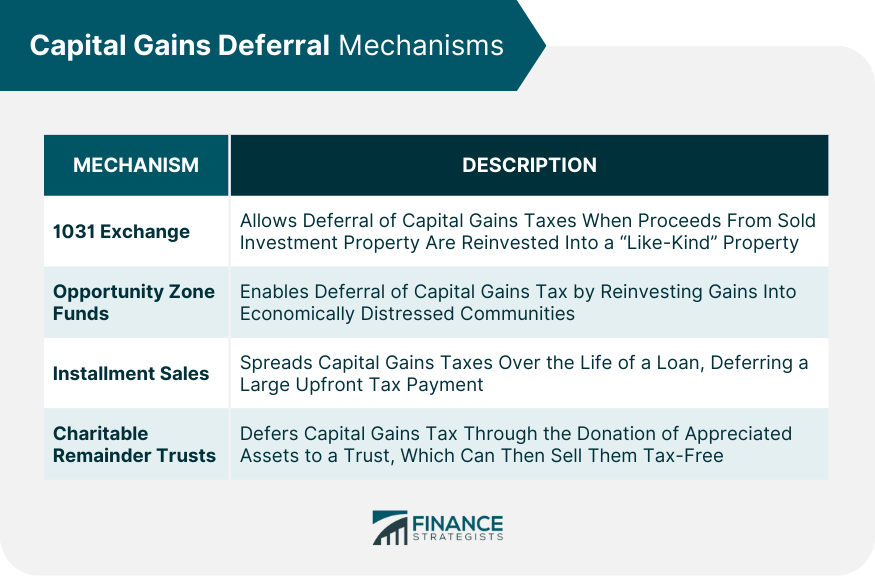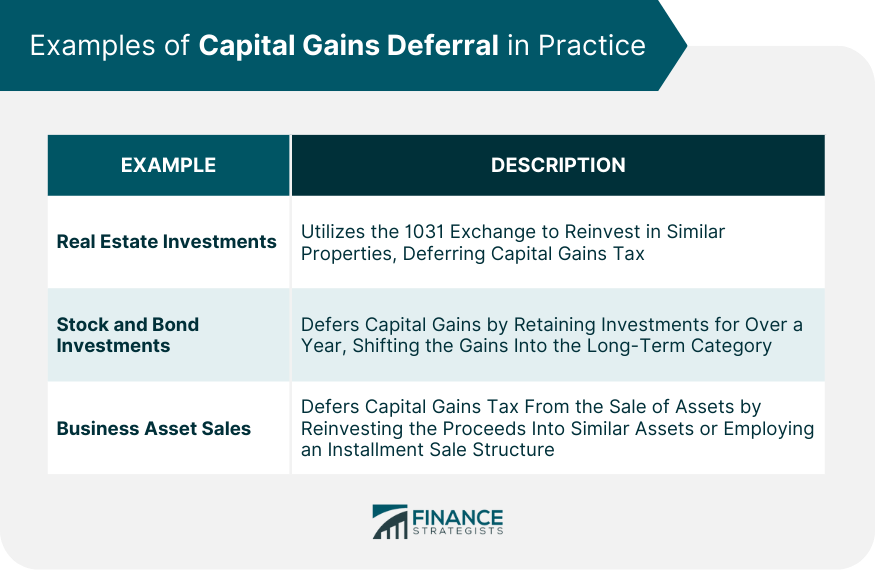Capital gains deferral is the legal and strategic financial practice that enables investors to postpone the payment of taxes on the increased value of an investment or asset until a later date. This practice can offer significant advantages by enabling the maintenance of an investment's compound growth and providing tax benefits. By delaying the realization of capital gains through mechanisms such as 1031 exchanges, Opportunity Zone Funds, installment sales, and Charitable Remainder Trusts, investors can reinvest the would-be tax payments, fostering a larger capital base for future growth. It's important to note, however, that deferral simply postpones the tax obligation, it doesn't eliminate it, and changes in tax laws can influence deferral strategies. Therefore, regular review and adjustment of these strategies are vital. Short-term capital gains originate from assets owned for a year or less. They are typically taxed as ordinary income, based on the taxpayer's marginal rate. Long-term capital gains stem from assets owned for more than one year. They are taxed at a lower rate, making them more beneficial for taxpayers. Capital gains deferral is a strategy that allows these taxes to be postponed until a future date. This delay is achieved through certain investment vehicles or strategies that postpone the realization of the gains. Various mechanisms such as 1031 exchanges, Opportunity Zone Funds, installment sales, and Charitable Remainder Trusts can be utilized for capital gains deferral. These mechanisms defer the tax obligation, allowing the would-be tax payments to be reinvested, which fosters a larger capital base for future growth. The IRS has specific regulations that guide capital gains deferral. These regulations determine which transactions qualify for deferral and lay out the stipulations for maintaining deferral status. Certain conditions must be met for capital gains to be deferred, such as the reinvestment of the gains into a similar asset within a specified time period, among others. A 1031 exchange, named after Section 1031 of the U.S. Internal Revenue Code, allows the deferral of capital gains taxes when an investment property is sold and the proceeds are reinvested into a "like-kind" property. Opportunity Zone Funds offer a unique way to defer capital gains tax by reinvesting the gains into economically distressed communities. Installment sales allow for capital gains taxes to be spread over the life of the loan, thereby deferring a large upfront tax payment. Charitable Remainder Trusts (CRT) allow for deferral of capital gains tax by donating appreciated assets to a trust that can then sell them tax-free. In real estate, investors often use the 1031 exchange to defer capital gains tax by reinvesting in similar properties. This allows for continual property upgrades without immediate tax penalties. In stock and bond investments, capital gains can be deferred by holding onto the investments for over a year, moving the gains into the long-term category, which is taxed at a lower rate. Businesses can defer capital gains tax from the sale of assets by reinvesting the proceeds into similar assets or using an installment sale structure. Capital gains deferral can result in substantial tax savings, allowing more capital to be kept for reinvestment or other purposes. For retirement planning, capital gains deferral can be a useful strategy. By strategically planning the sale of assets, individuals can potentially minimize their tax liabilities during retirement. A well-considered capital gains deferral strategy can significantly influence an investor's broader investment approach, as it can allow for more aggressive investment knowing that gains can be deferred. Capital gains deferral mechanisms stimulate economic growth by encouraging investments in various sectors. They allow capital to be reinvested, promoting economic activity and growth. The concept of capital gains deferral is not without controversy. Some view it as a tax loophole that primarily benefits the wealthy, while others argue it encourages beneficial economic activity. Capital gains deferral is a powerful financial strategy that allows investors to postpone the payment of taxes on the appreciation of assets. This strategy provides key benefits such as preserving investment growth and affording significant tax advantages. Capital gains deferral mechanisms, including 1031 exchanges, Opportunity Zone Funds, installment sales, and Charitable Remainder Trusts, all contribute to fostering a more robust capital base for future growth. Yet, it's crucial to understand that deferral doesn't nullify tax obligations but merely postpones them. The deferral strategy's effectiveness can also be affected by changes in tax laws, underscoring the need for regular review and potential adjustments. Capital gains deferral not only influences personal finance but also plays a significant role in stimulating economic growth and shaping policy debates. Despite the controversies, its impact on investment strategy and national economy cannot be underestimated.What Is Capital Gains Deferral?
Types of Capital Gains
Short-Term Capital Gains
Long-Term Capital Gains
How Capital Gains Deferral Works
Concept of Deferral
Mechanisms for Deferral
Legal Provisions for Capital Gains Deferral
Internal Revenue Service (IRS) Regulations
Conditions for Capital Gains Deferral
Capital Gains Deferral Mechanisms
1031 Exchange
Opportunity Zone Funds
Installment Sales
Charitable Remainder Trusts

Examples of Capital Gains Deferral in Practice
Real Estate Investments
Stock and Bond Investments
Business Asset Sales
Impact of Capital Gains Deferral on Personal Finance
Tax Implications
Retirement Planning
Investment Strategy

Capital Gains Deferral and Economic Policy
Role of Capital Gains Deferral in the National Economy
Policy Debates Surrounding Capital Gains Deferral
Conclusion
Capital Gains Deferral FAQs
Capital gains deferral refers to the legal strategy that allows investors to postpone paying capital gains taxes on the increased value of an investment or asset until a future date. This strategy enables the maintenance of the investment's compound growth and provides certain tax benefits.
Capital gains deferral works by utilizing certain investment vehicles or strategies that delay the realization of capital gains, thereby deferring the tax obligation to a future date. Examples of these strategies include 1031 exchanges, Opportunity Zone Funds, installment sales, and Charitable Remainder Trusts.
The primary benefit of deferring capital gains is the potential for increased investment growth over time. By deferring taxes, investors can reinvest the would-be tax payments, which provides a larger capital base for future growth. Additionally, deferral might allow investors to realize their gains in a year when they fall into a lower tax bracket.
A common misconception about capital gains deferral is that it equates to tax forgiveness. However, deferring capital gains tax doesn't eliminate the tax obligation; it only postpones it. Changes in tax laws can also affect the deferral strategy, potentially leading to an unexpected tax bill.
A well-planned capital gains deferral strategy can significantly influence an investor's broader investment approach. It can allow for more aggressive investment knowing that gains can be deferred. However, it's crucial to remember that changes in tax laws can impact deferral strategies, and thus, these strategies should be regularly reviewed and adjusted if necessary.
True Tamplin is a published author, public speaker, CEO of UpDigital, and founder of Finance Strategists.
True is a Certified Educator in Personal Finance (CEPF®), author of The Handy Financial Ratios Guide, a member of the Society for Advancing Business Editing and Writing, contributes to his financial education site, Finance Strategists, and has spoken to various financial communities such as the CFA Institute, as well as university students like his Alma mater, Biola University, where he received a bachelor of science in business and data analytics.
To learn more about True, visit his personal website or view his author profiles on Amazon, Nasdaq and Forbes.











